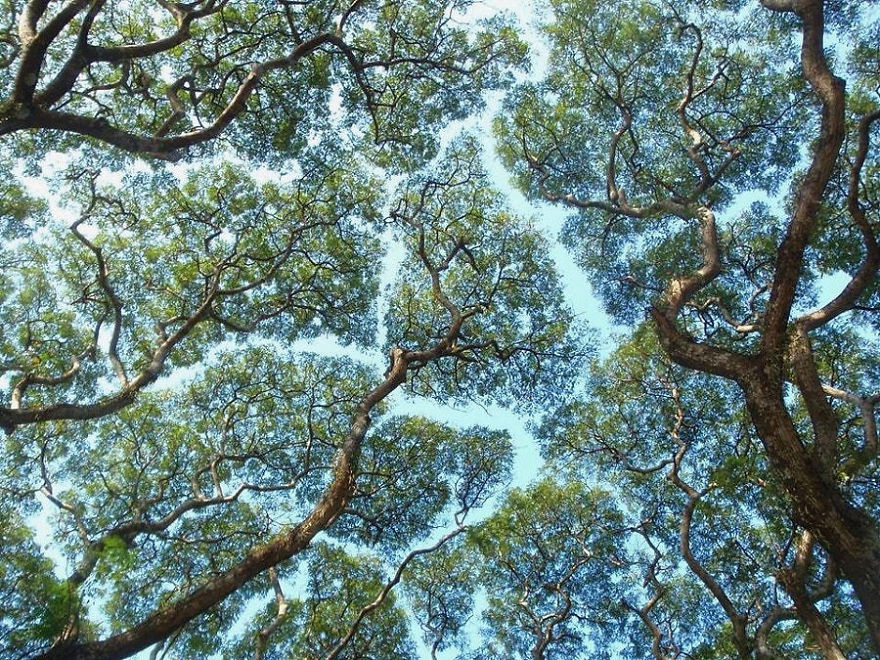This is the thought I’ve been thinking since I learned the small branches growing near the bottom of tall trees in early spring are sometimes called ‘defender branches’.
In his book ‘How to Read a Tree’, which I enjoyed reading more than any book in years, Tristan Gooley explains that these branches shoot out near the base of old trees to shade the ground so that no new saplings take root. They are called ‘defender branches’ because they are defending the older tree against an attack on resources by new younger trees.
His explanation struck me as odd because I wasn’t seeing trees as things that fight to survive. I saw them as aspects of a larger whole that cooperate in their coming into being.
The way trees share light, for example, is expressed in how the leading buds stop the growth of their parent branches when they touch the leaves of another tree. This is why trees in a canopy can seem to fit together like a jigsaw puzzle. The trees share space and share light.
What if, I wondered, the branches that shoot from low on the trunk in early spring are not defenders, but the gentle guiding arms of a mother, teaching her children where to find their independence and strength? Indeed, her offspring will be more likely to grow tall where resources are not already being used. What if this is akin to the encouragement of a baby to leave the breast and consume the foods of the world?
The possibilities for new meanings are endless, but the gift of what I saw in my inquiry was not a more accurate way of defining these branches. The gift was waking up to the possibility that competition is merely a perspective.
If we take the inquiry to the extreme, what difference is there between fucking and fighting?
One aims toward birth and the other toward death.
But death is only an end when that which dies is not seen as part of the whole. When a part of something dies, that death is a transformation. Without the illusion of separateness, death is birth.
None of this suggests we don’t have a preference. We certainly prefer living over dying.
But when there are no defenders, competitions transfigure into cooperations.
Instead of people vying for their place, we see people dancing. Where before we saw a riot, we see a party.
A riot is not the kind of party most of us would like to attend, but seeing it as a party does make a difference. When we see the party, our preference may remain but our resistance falls away.
At the start of the pandemic, my friend Mark Sequoia, a former teacher who homeschooled his children, wrote a simple line of medicine for the many parents suddenly thrust into the role of educator.
“Your children cannot get behind because life is not a race.”
Until now, I have found much solace in this by remembering I don’t need to worry about my children competing educationally or professionally.
Today, as his medicine comes to me while writing, I’m hearing the last five words deeper than ever.
“Life is not a race.”
What if we aren’t all vying for survival? What if that’s just a story we’ve been sold?
What if there are no defenders and, in truth, we are all always cooperating, whether we see it this way or not?
The beady eye of the rooster I shot in the head on Monday makes this hard to see. The threat of a bomb landing on my friend’s home in Ukraine makes this even harder to see.
When I am very still though, when I am most deeply present with the unfolding of all things, here I can see that we are never competing. I can see that even in this messy, bloody world we are actually cooperating. I can see that we are creating, working together as parts of a whole to bring into being something we do not know.
This is a more beautiful world. There is still heartbreak in it. There is still the struggle to get away from hurt, but without competition our resistance to this fact is removed.
We resisted competition because deep down, we knew we didn’t have to compete. Not in the sense that there need not be struggle, but in that we knew we need not be alone.
I like the look and feel of a world in which there are no defenders; a world in which we belong to one another and we are creating together.
When I see young branches shooting out from the base of a tall tree, I see the gentle guiding arms of our sisters and brothers, inviting us to share.
“What if there are no defenders?”
Then all competition is an illusion and we are always cooperating as parts of something greater than we know.
Look at the world through this lens this week and share with me what you see.
Loving us all, JPM
PS – My next Master’s Circle has a couple of spaces left. If you’re ready for an extraordinary challenge that will cut to the core of how you see yourself and your world – and put you on a new personal and professional trajectory – the reach out and let’s talk.

